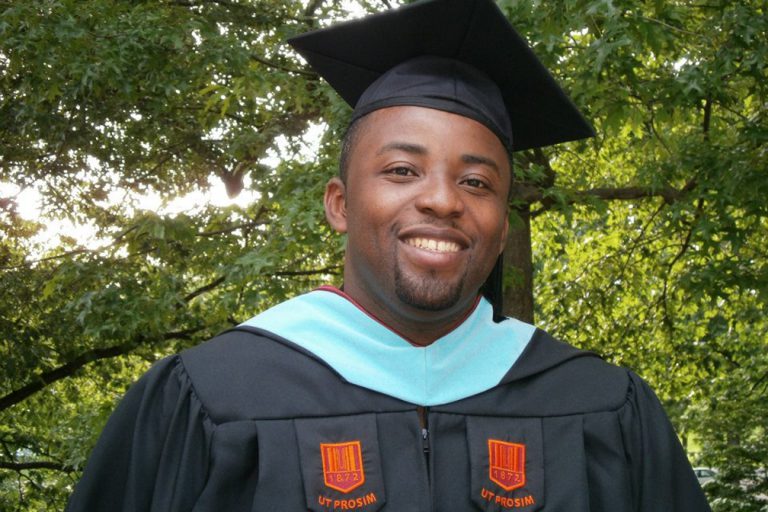School of Education Graduate Gives Back to Haiti
January 25, 2018
Mario Calixte earned his master’s degree from the Virginia Tech School of Education in 2012.

In Haiti, the workday starts early, at 4 a.m.
The sun won’t be fully out for several more hours when Mario Calixte, a graduate of Virginia Tech, heads to his day job in the bustle of motorbikes, pedestrians, and burros that jockey for space in the morning traffic in the Haitian capital of Port-au-Prince.
Calixte, who has a bachelor’s degree in computer science from the College of Engineering and a master’s in instructional design and technology from the School of Education in the College of Liberal Arts and Human Sciences, works at the Ecole Supérieure d’Infotronique d’Haïti, where he advises students and develops curriculums for those who attend the country’s flagship university.
But that’s just one of his jobs.
In his “off hours” Calixte travels on weekends throughout the country setting up computer labs and teaching elementary and high school instructors basic computer and Linux operating system skills, and how to use and integrate various educational computer-based applications into their curriculum. The content of the computer applications touches topics that range from proper handwashing techniques and infant care to language, geography, math, and science.
“Imagine teaching computer science or showing someone a computer who has never been exposed to any kind of computing machine,” said Calixte. “It’s a challenge for both me and the teachers for sure, but I have been surprised how quickly many of them can become comfortable with this technology, usually in less than eight hours. It’s encouraging, and I know I am making a difference in the students’ ability to succeed intellectually, academically, and professionally.”
Calixte’s computer science degree could have easily opened doors to any number of lucrative careers, but he was seeking an opportunity to give back to his country when he obtained his undergraduate degree in 2010 after the country suffered the devastating January earthquake. He got the opportunity to position himself to do just that with a Google scholarship to pursue a graduate degree in instructional design and technology. He later graduated in 2012 and returned to his homeland.
“The adoption of technology in a country like Haiti can have profound impacts on its economy and more importantly on its education system,” said Calixte. “Effective use of information and communication technologies can be a key ingredient to bring well-needed changes to the education system of Haiti. Technology can help to bring transformational learning gains, increased academic opportunities, and enhanced scholarly outcomes in education sector in Haiti.”
Calixte works in conjunction with faith-based organizations and other nonprofits that donate computers to the schools where he trains teachers.
Denny Baumann became aware of Calixte when he started making inquiries about volunteers that could help him reach out to more schools through his affiliation with the Methodist church. He had heard rumors of several Virginia Tech graduates who resided in Haiti, and that’s when he contacted Calixte. Baumann is retired in Vero Beach, Florida, and he assembles the computers, educational software packages, and remote servers that Calixte uses to set up the computer learning labs.
“Mario helped us to expand our outreach efforts exponentially,” said Baumann. “We are now taking these labs that can teach young students about geography, languages, writing, and arithmetic, and taking this concept to health care in Haiti.”
Baumann is currently developing a product he calls Medical Internet in a Box that will host free content from Medical Aid Films, Global Health Media, the Hesperian Project, as well as other organizations that make this content available. He is also coordinating the translation and recording of Medical Aid Films into Haitian Creole.
“Most poor villages only have a doctor come through maybe twice a year,” said Baumann. “So, the Medical Internet in a Box can help communities access basic health information, such as how to prevent cholera and properly care for an infant.”
The grassroots computer labs that Calixte helps to establish are imperative technology initiatives for a country like Haiti, which has numerous infrastructure problems, to be able to provide the next generation with the ability to compete in the 21st-century global marketplace.
“My education and training in computer science and instructional design at Virginia Tech have exceptionally prepared me for real-life situations and my career in Haiti,” said Calixte. “Whether it’s the courses I took or the internships I participated in, they all played a crucial part in my career development and developing critical- and creative-thinking skills necessary to better accomplish my work here.”
Calixte is focused on the immediate goal of finding ways to improve life through technology in his native country, but a doctoral degree is on the horizon.
That is, as soon as he can find the time.
Written by Amy Loeffler







